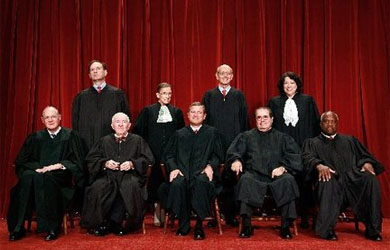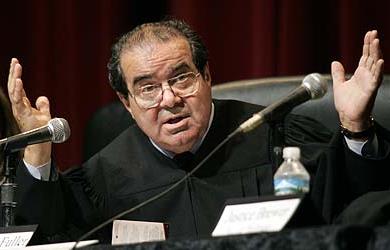The following is an excerpt from a post on the People For blog on the Republican attempt to block any nominee President Obama chooses to fill the Supreme Court vacancy left by the passing of Justice Antonin Scalia:
Just as the Constitution and principle are not on the GOP’s side, neither are the facts. For instance, Ohio Sen. Rob Portman has said that “it’s been nearly 80 years since any president was permitted to immediately fill a vacancy that arose in a presidential election year.” His constituents could be forgiven for inferring that the situation we now face is common, and that nomination and confirmation of Scalia’s replacement this year would go against historical norms.
However, the current situation is anything but common. The fortunate reality is that it is extremely rare for a Supreme Court justice to die in office. In fact, since 1950, this is only the fourth time a sitting justice has passed away, and this is the only time it has happened in a presidential election year:
1. Chief Justice Fred Vinson – died in 1953
2. Justice Robert Jackson – died in 1954
3. Chief Justice William Rehnquist – died in 2005
4. Justice Antonin Scalia – died in 2016
Thankfully, this is an extremely unusual situation. Republicans cannot cite precedent for an incumbent president under these circumstances to abstain from carrying out his constitutional duties and force Americans to wait a year or more for the next president to fill a sudden, unexpected vacancy on the nation’s highest court, simply because it was a presidential election year when a justice died.
Justices who retire often time their announcements in time for a replacement to be nominated and confirmed by the beginning of the next Supreme Court term. That is why most of the current justices were able to take their seats in time for the traditional First Monday in October, ensuring a full complement of nine justices. As an alternative way to protect the institution, Sandra Day O’Connor agreed to remain on the Court until her replacement could be confirmed. So even though Justice Alito was confirmed in January 2006, the middle of the term, the nation’s highest court was not forced to operate short-staffed. In ways such as these, retiring justices have sought to protect the integrity of the Court by ensuring it be able to operate at full capacity.
Unfortunately, despite Justice Scalia’s devotion to the Court he served on for three decades, he did not have the opportunity to protect it from having to operate short-staffed. And yet many Republicans are vowing to keep the Court hobbled for as long as possible.







